

Build with Confidence: Secure Your Arizona Contractor License and Lay the Foundation for Success! Get Your General Contractor License in Arizona.
Explore the essential guide to obtaining a general contractor license in Arizona. From navigating license classifications to meeting bond and insurance requirements, this article provides a step-by-step roadmap for contractors to ensure compliance, credibility, and success in the construction industry. Stay informed about application processes, continuing education, and renewal protocols to maintain your professional edge. Get licensed, get protected, and get built in Arizona today!
Alternate Phone Number: 512-463-6599 (For calls outside Texas)
Alternate Phone Number: 512-463-6599 (For calls outside Texas)
Phone: 602-542-1525
Alternate Phone Number: 512-463-6599 (For calls outside Texas)
Alternate Phone Number: 512-463-6599 (For calls outside Texas)
Address: Arizona Registrar of Contractors 1700 W. Washington Street, Suite 105, Phoenix, AZ 85007
The ROC website provides resources on contractor licensing, including applications, exams, insurance requirements, and details about bonding for contractors in Arizona.
Who Needs a License in Arizona?
In the Grand Canyon State, a general contractor’s license is not just a formality; it’s a legal requirement for anyone who intends to build, alter, repair, add to, subtract from, improve, move, wreck, or demolish any structure. This encompasses a wide range of activities and projects, from erecting new buildings to renovating existing ones, and applies to both individuals and businesses. Whether you’re laying the foundation for a skyscraper, remodeling a family home, or paving a driveway, Arizona law mandates that you hold a valid state general contractor license.
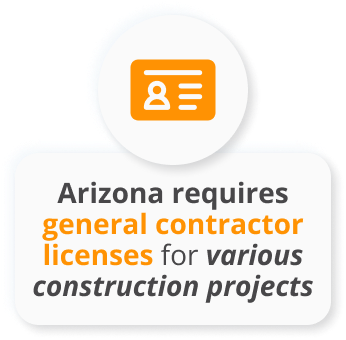
The Importance of Licensing for Residential and Commercial Projects
Licensing serves as a cornerstone of the construction industry in Arizona, ensuring that all projects, be they residential or commercial, are executed to the highest standards. For residential projects, a license assures homeowners that their most valuable asset is in capable hands. It’s a promise of quality, safety, and reliability. For commercial projects, a license is a testament to a contractor’s ability to handle complex, large-scale operations that form the backbone of Arizona’s infrastructure and economy.
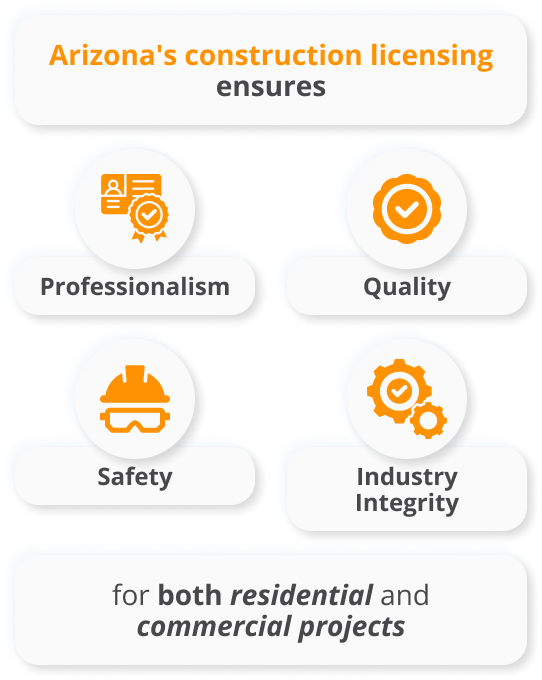
By adhering to licensing requirements, contractors demonstrate their commitment to professionalism and compliance with state regulations. It’s not just about following the law; it’s about upholding the integrity of the construction industry and protecting the interests of consumers and businesses alike. In a state that’s known for its dynamic growth and development, a contractor’s license is the golden ticket to participating in Arizona’s vibrant construction sector.
Commercial License: Building the Business Landscape
A commercial general contractor license in Arizona is the key to shaping the state’s business infrastructure. It authorizes contractors to take on a variety of projects, including the construction of office buildings, retail centers, and industrial facilities. This license is tailored for those who aim to contribute to Arizona’s commercial growth, allowing them to construct new spaces for businesses or renovate existing structures to meet modern needs.
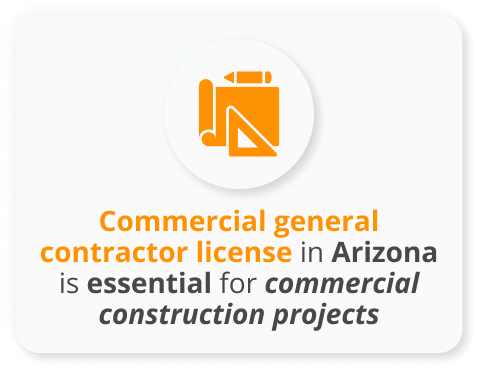
Residential License: Crafting Homes and Communities
The residential license is dedicated to contractors focusing on housing. It allows them to build or modify single-family homes, apartments, and condominiums. This license is crucial for contractors who are in the business of creating living spaces, ensuring they have the qualifications to provide safe, reliable, and quality homes that adhere to the state’s residential building codes.
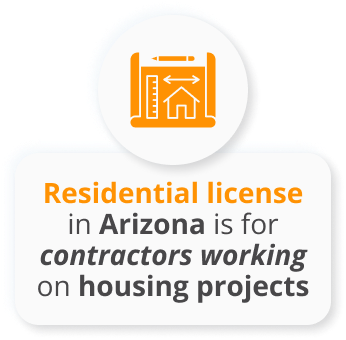
Dual License: Versatility in Construction
For contractors who do not want to limit their expertise to one sector, Arizona offers a dual license. This versatile option empowers contractors to work on both residential and commercial projects, providing the flexibility to take on a diverse range of jobs. With a dual license, contractors can seamlessly transition between building a family’s dream home and constructing a commercial powerhouse, making them invaluable assets in Arizona’s construction industry.
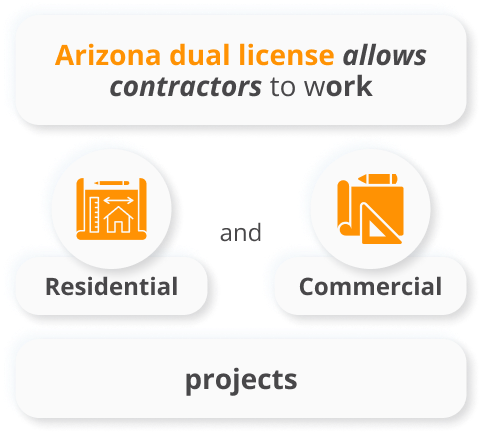
Scope of Work Permitted Under Each License
Each license classification comes with its own set of permissions and limitations:
Before diving into the application process, ensure you meet the basic requirements:
A clean criminal record is essential:
Secure your financial responsibility:
Prepare for the industry:
Demonstrate your expertise:
Put it all together:
Cover your liabilities:
Double-check your application:
Financial Assurance: Navigating Surety Bond Requirements for Arizona Contractors
Understanding Surety Bonds
A surety bond is a three-party agreement between the contractor, the entity requiring the bond (the state of Arizona), and the surety company that provides the bond. It acts as a financial guarantee that the contractor will comply with all applicable laws and regulations.
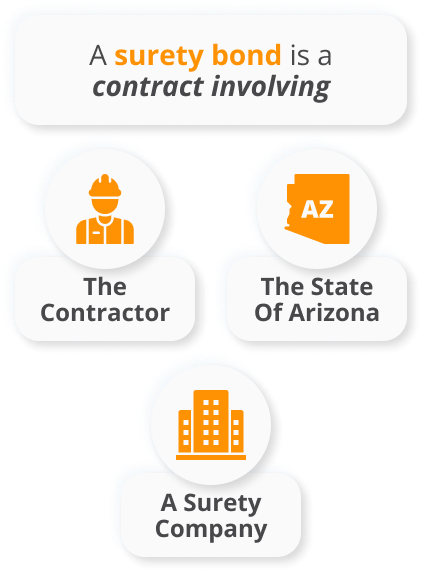
Bond Amounts and Project Size
The bond amount you’re required to secure depends on the scale of the projects you intend to undertake:
Determining Your Bond Amount
To determine the exact bond amount required, consider the following:
Obtaining a Surety Bond
Here’s how to secure a surety bond:
Significance of the Surety Bond
The surety bond serves several key purposes:
These are common questions about General Contractor License in Arizona
Any individual or business that builds, alters, repairs, adds to, subtracts from, improves, moves, wrecks, or demolishes any structure must have a state general contractor license to work in Arizona. This applies to both residential and commercial projects.
Arizona offers three main license classifications for general contractors: Commercial (for commercial projects), Residential (for residential projects), and Dual (allowing work on both commercial and residential projects).
You must be at least 18 years old, have a valid Social Security number, be a resident of Arizona or have a business located in Arizona, pass a criminal background check, obtain a surety bond, complete a prelicensure education course, and pass a trade exam.
The application fee for a commercial license is $200, and the license fee is $580. For a residential license, the application fee is $180, and the license fee is $320. Additionally, there is a $370 recovery fund assessment for residential licenses.
The bond amount required depends on the license type and the volume of work you intend to perform, ranging from $5,000 to $100,000.
Written by: John BrownJohn has more than 25 years of experience in the insurance industry. He grew from a star insurance producer to owning one of the largest agencies in the country; he's a reference regarding contractor's insurance, commercial insurance, and builders' risk insurance.